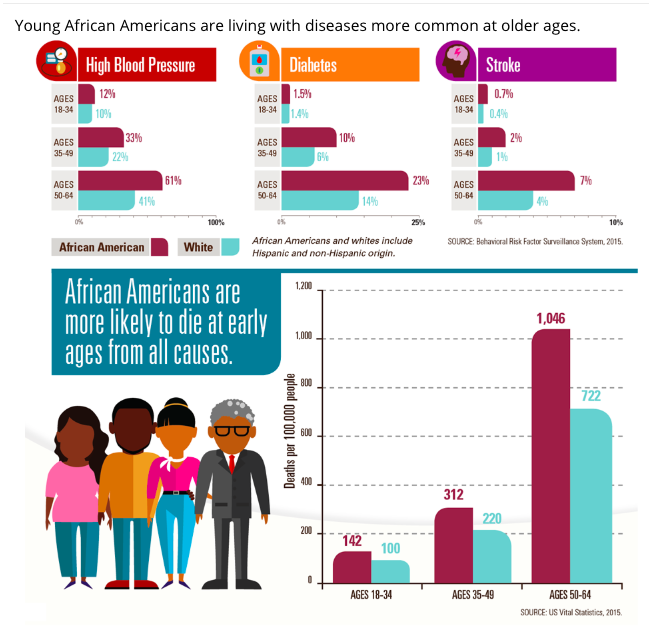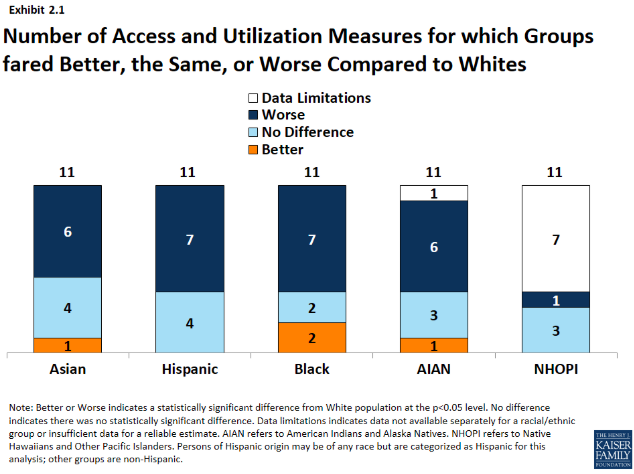Two quick facts about healthcare in the US.
One – we white people are a lot healthier than people of color and native Americans. This is particularly true for African Americans.

Two, that’s because minorities have less access to healthcare.

I bring this to your attention as it seems particularly important today – Martin Luther King Jr’s birthday.
If you are near-poor, or live in a state like Mississippi that has crappy coverage for poor people under Medicaid, and/or are an ethnic minority, you will likely:
– die sooner,
– be less healthy, and
– go through life with less access to needed care.
What does this mean for us?
In a country as rich as ours, this is appalling. We can do so much better.



It is much more complicated than just :access”. Different cultures interact with the healthcare system differently, playing a much more significant role than “access”.
There was a pretty decent NPR episode I listened to recently that spoke to mistrust within the African American community of the healthcare system. An example was African American men not trusting/listening to advice/directions from non-black doctors. Essentially the mindset was the “white doctors’ didn’t have their best interest in mind. Think the Tuskegee experiment. The episode was advocating ways to increase more black doctors within the healthcare system.
Asian and hispanic cultures also interact with the healthcare system differently based on cultural beliefs/ideas, both resulting in less trust in eastern medicine and the US Healthcare system.
Scott – thanks for the note. I agree it is indeed more complex than “access” – however “access” is exactly what you refer to – and the cultural issues are inherent in difficulties with access to care.
I sit on the board of a Medicaid/duals healthplan. Most of our members are Hispanic and/or African American. We work on this every day, and trust is the most important part.
The infographic describes the result of that problem – poorer health status as a result of insufficient access.
Joe,
I agree with both you and Scott, but you have left out a very important factor as to why those diseases are the ones that African-Americans and Hispanics are dying from. It has to do with their diets and what foods are available or not available to people in those neighborhoods. We have heard politicians and even the last FLOTUS (not the current social climber) talk about “food deserts” in our inner cities where the only kinds of foods available are junk foods and sugary sodas. I even did a paper for one of my MHA classes on how the food and beverage industry was in bed with the FDA and Department of Agriculture, and that the anti-hunger activists would rather seem them eat that junk, than go hungry. Once they are exposed to fresh fruits and vegetables, get off drinking large quantities of soda and junk food, and have places in their neighborhoods that supply those items rather than the corner bodegas, then the incidents of high blood pressure, diabetes, and stroke will drop. Exercise, too will help that as well.
Hello Joe,
I think you could have delivered the same message without using the word “we” and exploiting the racial inequality in healthcare (particularly for African-Americans) to deliver a shock value so viewers will read this article. I am of Asian decent if that will add a little context to my perspective.
Hello Anon – thanks for the note. I used “we” to ensure readers know that I am Caucasian. I’m not sure what you are referring to regarding the second half of that sentence.
Are you suggesting that I should not have “exploited the racial inequality in healthcare” and that “shock value” was intended to get people to read the post?
thanks for clarifying – Joe